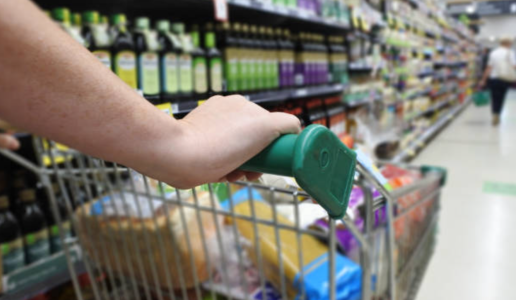Prices are soaring—here’s what you need to know about your grocery bill in 2025!
By
Gian T
- Replies 22
As we navigate the ever-turbulent seas of the cost-of-living crisis, many of our members have voiced their concerns about the rising prices of everyday essentials.
With 2025 on the horizon, the question on everyone's lips is: 'What will happen to grocery prices?' We've delved into the matter to clarify and give you tips on managing your grocery bill in these challenging times.
Stay with us as we explore what factors drive these increases and how you can make smart choices to keep your costs in check.
Firstly, let's address the elephant in the room: grocery prices are unlikely to see a significant drop in 2025.
Experts, including retail specialist Gary Mortimer from Queensland University of Technology, have indicated that the cost of a shopping basket will remain high.
‘Despite the inquiries that are going on, we're not going to see food prices fall dramatically,’ he said.
This is certainly not the news we hoped for, but facing reality head-on is important.
However, it's not all doom and gloom. There is a silver lining that suggests prices may not climb further at the checkout come the New Year.
One of the reasons for this potential price stabilisation is the Australian Competition and Consumer Commission's (ACCC) ongoing probe into the pricing strategies of major supermarkets like ALDI, IGA, Coles, and Woolworths.
The findings of this investigation are set to be revealed in early 2025, which could lead to increased scrutiny of the big firms.
With their reputations on the line, supermarkets might be more inclined to offer discounts and price promotions to win over public opinion.
'I do think supermarkets are very sensitive to public opinion and reputation,' Mortimer said.
'I think we'll probably see stabilisation. I think we'll see long-term discounting, prices locked down, rolled back, whatever they say.'
In the meantime, food prices have risen by 3.3 per cent over the 12 months to the September 2024 quarter, with fruit and vegetables taking a notable hit due to unfavourable growing conditions.
Other products like chocolate and eggs have also seen price increases due to record-high cocoa prices and supply shortages from bird flu concerns.
Mortimer explained that, in addition to stocking up on items when they are on offer, apps like Frugl can help guide shoppers to the best deals.
Regarding other essentials, such as clothing, he suggested that actions taken by Donald Trump in the USA might have short-term benefits for Australians.
This comes despite Treasurer Jim Chalmers's warnings about the potential trade war.
For instance, if Trump imposes tariffs on China, factories there could face a surplus of inventory, potentially leading to discounted prices as China seeks to sell off excess stock.
‘That's going to be really interesting,’ he said.
In other news, fares for the Opal public transport network in New South Wales are set to rise in 2025.
The increase will affect all modes of transport within the network, including buses, trains, ferries, metros, and light rails, impacting commuters across the state.
The Independent Pricing and Regulatory Tribunal (IPART) proposed the price hike as part of its recommendations for fare adjustments. You can read more about it here.
 What strategies have you found effective in managing your grocery bills? Share your experiences and tips in the comments below, and let's help each other through these challenging times.
What strategies have you found effective in managing your grocery bills? Share your experiences and tips in the comments below, and let's help each other through these challenging times.
With 2025 on the horizon, the question on everyone's lips is: 'What will happen to grocery prices?' We've delved into the matter to clarify and give you tips on managing your grocery bill in these challenging times.
Stay with us as we explore what factors drive these increases and how you can make smart choices to keep your costs in check.
Firstly, let's address the elephant in the room: grocery prices are unlikely to see a significant drop in 2025.
Experts, including retail specialist Gary Mortimer from Queensland University of Technology, have indicated that the cost of a shopping basket will remain high.
‘Despite the inquiries that are going on, we're not going to see food prices fall dramatically,’ he said.
This is certainly not the news we hoped for, but facing reality head-on is important.
However, it's not all doom and gloom. There is a silver lining that suggests prices may not climb further at the checkout come the New Year.
One of the reasons for this potential price stabilisation is the Australian Competition and Consumer Commission's (ACCC) ongoing probe into the pricing strategies of major supermarkets like ALDI, IGA, Coles, and Woolworths.
The findings of this investigation are set to be revealed in early 2025, which could lead to increased scrutiny of the big firms.
With their reputations on the line, supermarkets might be more inclined to offer discounts and price promotions to win over public opinion.
'I do think supermarkets are very sensitive to public opinion and reputation,' Mortimer said.
'I think we'll probably see stabilisation. I think we'll see long-term discounting, prices locked down, rolled back, whatever they say.'
In the meantime, food prices have risen by 3.3 per cent over the 12 months to the September 2024 quarter, with fruit and vegetables taking a notable hit due to unfavourable growing conditions.
Other products like chocolate and eggs have also seen price increases due to record-high cocoa prices and supply shortages from bird flu concerns.
Mortimer explained that, in addition to stocking up on items when they are on offer, apps like Frugl can help guide shoppers to the best deals.
Regarding other essentials, such as clothing, he suggested that actions taken by Donald Trump in the USA might have short-term benefits for Australians.
This comes despite Treasurer Jim Chalmers's warnings about the potential trade war.
For instance, if Trump imposes tariffs on China, factories there could face a surplus of inventory, potentially leading to discounted prices as China seeks to sell off excess stock.
‘That's going to be really interesting,’ he said.
In other news, fares for the Opal public transport network in New South Wales are set to rise in 2025.
The increase will affect all modes of transport within the network, including buses, trains, ferries, metros, and light rails, impacting commuters across the state.
The Independent Pricing and Regulatory Tribunal (IPART) proposed the price hike as part of its recommendations for fare adjustments. You can read more about it here.
Key Takeaways
- Experts predict that grocery prices in Australia are unlikely to fall in 2025 amidst the ongoing cost of living crisis.
- The Australian Competition and Consumer Commission (ACCC) is researching supermarket pricing strategies, with findings expected to be released in early 2025, which could influence pricing decisions.
- Retail expert Gary Mortimer anticipates that supermarkets will focus on price stability and promotions, potentially offering significant discounts on specific items as a response to public sensitivity over pricing.
- Despite a general rise in food prices, shopping apps like Frugl and market dynamics, such as the impact of US trade policies with China, could potentially yield short-term benefits for Australian consumers through discounted goods.








